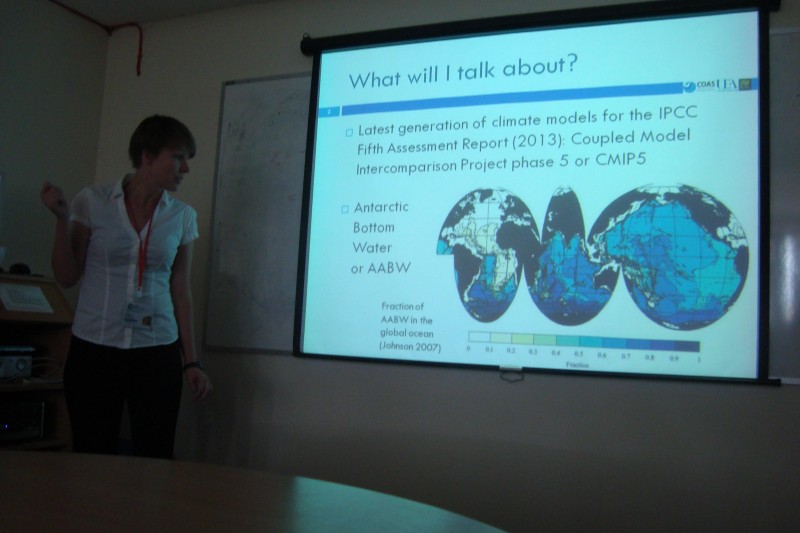Challenger Society 2014 conference in Plymouth
Céline Heuzé
Centre for Ocean and Atmospheric Sciences

Challenger Society 2014 conference in Plymouth
On the first week of September I embarked on a (long) journey to Plymouth to attend this year Challenger Society for Marine Sciences Conference. Despite my initial failure at understanding how to switch off the bathroom light, the conference was a great success! Over 300 scientists from the UK and abroad had gathered for four intense days of parallel sessions on various aspects of marine sciences, from thermal vent sea worms to satellite observations. Workwise, this conference was really useful to me as I learnt more about the model I was writing about for my thesis. It was also very relevant for my future post-doc: before the conference, I roughly knew what I wanted to work on; after it, I had a clearer idea of the current research on that topic, and thanks to the Wednesday early-career session I learnt how to make myself more visible to people working on it. The Thursday afternoon “observation and modelling” session was obviously key to me as I gave a talk there. I struggled to attach my microphone, walked in the wrong direction and created a deafening Larsen effect, and could not have the pointer to move slides for me, but the talk itself went very well. I received great encouraging feedbacks in the subsequent coffee break. Even my paper’s reviewer gave me the thumbs up!
A conference is not just about the formal talks, it’s also about the social activities, and this Conference definitely rocked it! Breaking the ice while watching sharks swimming by was a unique experience. Observing said sharks from the tiny divers’ platform with a group of fellow Challenger-ers during the behind-the-scene visit was another one. For the non shark-obsessed readers, I could mention that the coffee flowed at each break, the poster presenters were highly enthusiastic, the glasses of wine (far too) numerous and the weather surprisingly sunny. The pub crawl and conference dinner allowed me to casually chat with people I would not have dared talking to otherwise, and I’m pretty sure one of them said we should work together...
A huge thank you to the organisers for the conference itself and for all the social activities! And of course, I thank the Challenger Society for Marine Sciences for supporting me with the student travel award. I’m looking forward to attending Challenger 2016!
Profile of award-winner: Céline Heuzé
After an engineering degree in hydrodynamics, I realised I did not want to spend my life designing ship and moved to oceanography. Three years later, I have nearly finished my PhD with Karen Heywood (UEA), David Stevens (UEA) and Jeff Ridley (UK Met Office) on Antarctic Bottom Water in CMIP5 models. The Challenger Travel award allowed me to present the work from our upcoming second paper (Journal of Climate): “Changes in global ocean bottom properties and volume transports in CMIP5 models under climate change scenarios”
Latest News
Royal Society Publishing Photography Competition 2025
Please see a message from the Royal Society below:
We are delighted to announce that the 2025 Competition is now open for entries until 15 August for a chance to win £1000! The competition celebrates the power of photography in conveying the wonder of science happening all around us and photographs can be submitted in the categories of: Astronomy, Behaviour, Earth Science and Climatology, Ecology and Environmental Science, and Microimaging.
The competition is free to enter and open to anyone studying or working in science at graduate level or above. Category winners will receive a one-year membership to the Royal Photographic Society and the overall winner will receive a grand prize of £1,000. Find out more: https://bit.ly/RSPphotocomp
October 2025 MEDIN Workshop: Marine Data Management, Governance and the MEDIN toolset
The Marine Environmental Data and Information Network (MEDIN) are pleased to announce that registration is now open for the next occurrence of our popular free online training workshop: ‘Marine Data Management, Governance and the MEDIN toolset’ on the 13th – 17th October 2025 on OceanTeacher Global Academy.
Marine Data Management, Governance and the MEDIN toolset
The Marine Environmental Data and Information Network (MEDIN) and OceanWise are delighted to invite you to attend our popular free online training workshop: ‘Marine Data Management, Governance and the MEDIN toolset’ on the 19th – 23rd of May 2025.
